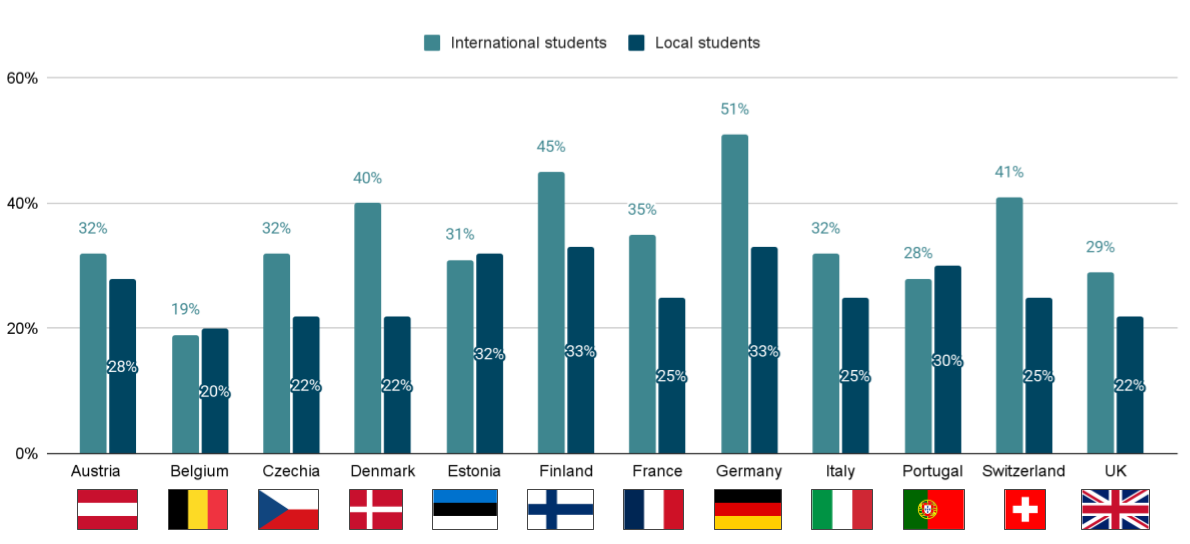En un reciente seminario web de Wawiwa celebrado el 21 de enero de 2025, exploramos la escasez de talento tecnológico en Europa, destacando cómo las bajas tasas de natalidad afectan a la matriculación de estudiantes y a la mano de obra, y cómo la atracción de estudiantes internacionales puede ayudar a cubrir puestos de trabajo tecnológicos de alta demanda. Hablamos de la recualificación, la mejora de las cualificaciones y el papel de la empleabilidad en la movilidad de los estudiantes, compartiendo consejos prácticos para que los gobiernos, las universidades y los centros de formación atraigan y retengan a los estudiantes internacionales.
Vea ahora la grabación del seminario web
Los oradores

Dra. Janet Ilieva, fundadora y directora de Education Insight
Janet es una economista con 20 años de experiencia internacional en investigación y análisis de políticas educativas, especializada en la movilidad mundial de los estudiantes y la educación transnacional. Su investigación, basada en datos empíricos, sirve de base a estrategias para gobiernos, universidades y organizaciones internacionales, impulsando políticas que configuran el panorama mundial de la educación superior.

Lucas Cepero, Fundador y Director del Consejo Internacional de Educación (ICEDU)
Lucas está especializado en educación internacional y colabora con instituciones para fomentar asociaciones transfronterizas, mejorar el acceso a la educación y apoyar el desarrollo del talento. Lucas se compromete a dar forma a estrategias que atraigan a estudiantes internacionales y aborden las cambiantes demandas de la mano de obra.

Leah Mansoor, Vicepresidenta de Desarrollo Empresarial de Wawiwa Tech
Leah cuenta con más de 15 años de experiencia en el desarrollo de negocios globales y en la dirección de operaciones internacionales. Ha dirigido la creación de nuevas unidades de negocio, establecido asociaciones estratégicas y perfeccionado estrategias de mercado. A Leah le apasiona fomentar la colaboración intercultural e impulsar el crecimiento internacional en la educación y la empresa.



Dra. Janet Ilieva, fundadora y directora de Education Insight
Janet es una economista con 20 años de experiencia internacional en investigación y análisis de políticas educativas, especializada en la movilidad mundial de los estudiantes y la educación transnacional. Su investigación, basada en datos empíricos, sirve de base a estrategias para gobiernos, universidades y organizaciones internacionales, impulsando políticas que configuran el panorama mundial de la educación superior.
Lucas Cepero, Fundador y Director del Consejo Internacional de Educación (ICEDU)
Lucas está especializado en educación internacional y colabora con instituciones para fomentar asociaciones transfronterizas, mejorar el acceso a la educación y apoyar el desarrollo del talento. Lucas se compromete a dar forma a estrategias que atraigan a estudiantes internacionales y aborden las cambiantes demandas de la mano de obra.
Leah Mansoor, Vicepresidenta de Desarrollo Empresarial de Wawiwa Tech
Leah cuenta con más de 15 años de experiencia en el desarrollo de negocios globales y en la dirección de operaciones internacionales. Ha dirigido la creación de nuevas unidades de negocio, establecido asociaciones estratégicas y perfeccionado estrategias de mercado. A Leah le apasiona fomentar la colaboración intercultural e impulsar el crecimiento internacional en la educación y la empresa.
El impacto de la baja natalidad en la matriculación de estudiantes y la mano de obra en Europa
Europa se enfrenta a un declive demográfico, con tasas de natalidad inferiores a las necesarias para una población estable. Esta tendencia repercute directamente en la matriculación de estudiantes y, a su vez, en la reserva de talento disponible para la mano de obra. La tasa media de natalidad en Europa es de 9 por cada 1.000 habitantes, casi un 6% menos que en 2022. Se necesitan entre 12 y 13 nacimientos por cada 1.000 habitantes para mantener la población de una nación. A continuación figuran algunos ejemplos de países europeos con tasas de natalidad extremadamente bajas.

La Dra. Janet Ilieva, destacó que este declive afecta tanto a las instituciones de enseñanza superior como al mercado laboral: "Si tenemos en cuenta los datos de las Naciones Unidas sobre los jóvenes de 18 años -los que tienen más probabilidades de matricularse en la universidad- vemos que es probable que el descenso persista en las principales economías de Europa." Janet señaló que, aparte de Turquía y Rusia, ningún país europeo figura entre los 20 primeros del mundo en cuanto a número de jóvenes de 18 años, lo que deja claro que Europa debe mirar más allá de sus fronteras para mantener su mano de obra.
Además, el descenso de la matriculación en titulaciones STEM es una preocupación clave. En algunos países europeos, menos de 30% de estudiantes se dedican a campos STEM, mientras que en países no europeos como China, esta cifra alcanza casi los 50%.. Los panelistas debatieron que el menor número de estudiantes en campos STEM contribuye a la escasez de profesionales tecnológicos en Europa, lo que refuerza la urgencia de atraer a estudiantes internacionales. Según los datos, los estudiantes internacionales tienen más probabilidades de cursar titulaciones STEM que los locales.

Recualificación y mejora de las cualificaciones tecnológicas: Una necesidad crítica
Aunque la llegada de estudiantes internacionales es parte de la solución, también es importante reciclar y actualizar la mano de obra existente para que pueda desempeñar trabajos y competencias tecnológicas. A medida que la tecnología evoluciona con rapidez, muchos profesionales encuentran que sus competencias están anticuadas, y todavía no hay suficientes oportunidades de programas de formación estructurados para mantenerse al día con las necesidades de la industria.
Leah Mansoor subrayó la importancia de la formación continua: "No basta con recurrir a los recién llegados o a los estudiantes más jóvenes para cubrir el déficit de talento tecnológico: hay que examinar la mano de obra existente y cómo puede formarse adecuadamente y encajar en el mercado laboral de la tecnología." Leah destacó que las empresas europeas deben dar prioridad a los programas de reciclaje y mejora de las competencias tecnológicas para ayudar a sus empleados a mantener sus capacidades de contribución.
Los panelistas señalaron que la migración y la movilidad de la mano de obra dentro de la UE influyen en la disponibilidad de talento tecnológico. Dado que los profesionales se trasladan a países mejor pagados o abandonan Europa en busca de mejores oportunidades en lugares como Estados Unidos, es aún más importante invertir en programas de formación tecnológica que ayuden a los profesionales a adaptarse al cambiante panorama digital.
La empleabilidad como factor clave de la movilidad de los estudiantes
Una de las principales motivaciones de los estudiantes internacionales para estudiar en el extranjero es la promesa de oportunidades de empleo. Las instituciones de educación superior que ofrecen grandes oportunidades de trabajo tras los estudios suelen atraer a más estudiantes internacionales, ya que estos dan prioridad a las perspectivas profesionales a la hora de elegir destino.
La Dra. Janet Ilieva señaló el impacto de la empleabilidad en las decisiones de los estudiantes: "Las oportunidades de trabajo después de los estudios son un gran factor impulsor. Países como el Reino Unido experimentaron un estancamiento en la demanda de estudiantes internacionales cuando suspendieron los visados de trabajo post-estudio, pero tras reintroducirlos, la demanda se disparó". Hizo hincapié en que los estudiantes buscan programas que no sólo ofrezcan una educación de calidad, sino también vías claras hacia el empleo.
Los países que permiten a los estudiantes internacionales adquirir experiencia laboral tras su graduación tendrán más posibilidades de retener este talento y de hacer frente a la falta de talento. Los países europeos que acojan más talento tecnológico tendrán las economías más fuertes en la era digital y de la IA.
Consejos prácticos para que universidades y centros de formación atraigan a estudiantes internacionales
Para atraer y retener a los estudiantes internacionales, las universidades y los centros de formación deben adaptarse al cambiante panorama educativo. El seminario web aportó valiosas ideas sobre lo que pueden hacer las instituciones educativas para resultar más atractivas al talento internacional.
- Ampliar las opciones de aprendizaje flexible: Las instituciones deberían considerar la posibilidad de realizar múltiples cursos a lo largo del año, en lugar de limitarse al tradicional comienzo en septiembre. El aprendizaje modular, la educación combinada y las microcredenciales pueden atraer a un mayor número de estudiantes.
- Reforzar las asociaciones con la industria: La colaboración entre universidades y empresas tecnológicas garantiza que los programas sigan siendo pertinentes para las necesidades del mercado. subrayó Lucas Cepero, "Si no nos comunicamos con la industria, corremos el riesgo de formar a los estudiantes para empleos que ya no existen." Los programas prácticos y adaptados a la industria pueden ayudar a salvar esta distancia.
- Aumentar las oportunidades de trabajo para los estudiantes: Los gobiernos y las instituciones deben garantizar que los estudiantes internacionales tengan acceso a prácticas, programas de cooperación y permisos de trabajo tras su graduación. Alemania ha tomado medidas para agilizar los procesos de obtención de visados para los talentos tecnológicos, dando un buen ejemplo a otras naciones europeas. Canadá está haciendo lo mismo en Norteamérica.
- Mejorar los servicios de apoyo a los estudiantes internacionales: Más allá de lo académico, las instituciones deberían centrarse en ofrecer alojamiento asequible, asistencia para la obtención de visados y orientación profesional para hacer de su país un destino más atractivo para los estudiantes que buscan labrarse un futuro en la tecnología.



